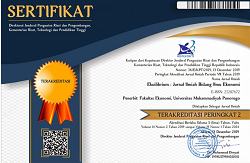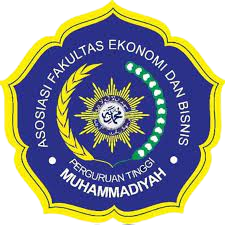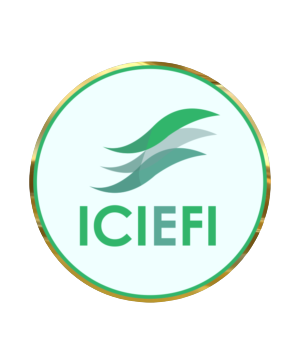Research Trends in Talent Management and Career Development: Why is Promotion Important? (Bibliometric Analysis)
DOI: 10.24269/ekuilibrium.v18i2.2023.pp190-202
Abstract
This study looks for connections between global career development and trends in talent management research. In the context of TM, career development plays an important role. This is because individual careers have significant potential to serve organizational strategic goals. After all, investment in organizational career development is beneficial not only for individuals, but also for organizational performance. For this research, the author processes Scopus index journal data using VOSviewer. This study used VOSviewer to analyze the data and map the most general and well-liked focal topics. 192 research papers in RIS format were used in this study. The Scopus database shows a fluctuation in the amount of research done on talent management and career development over the last few years and a decline in that interest. The VOSviewer analysis map classifies the most prominent nodes so that the most significant influence is the "talent" node so that it can be. The limitation of this study is that the data source was only compiled from prior studies; thus, more analysis would be beneficial to improve the data source and the reliability of the findings.
Keywords
References
- Abiwu, L., & Martins, I. (2022). Talent development as a source of sustainable competitive advantage for higher education institutions during the COVID-19 pandemic. SA Journal of Human Resource Management, 20. https://doi.org/10.4102/sajhrm.v20i0.1777
- Aina, R. Al, & Atan, T. (2020). The impact of implementing talent management practices on sustainable organizational performance. Sustainability (Switzerland), 12(20), 1–21. https://doi.org/10.3390/su12208372
- Akter, H., Ahmed, W., Sentosa, I., & Hizam, S. (2022). Crafting employee engagement through talent management practices in telecom sector. https://doi.org/10.4102/sajhrm
- Al- Dalahmeh, M. L. (2020). Talent Management: A Systematic Review. Oradea Journal of Business and Economics, 5(Special), 115–123. https://doi.org/10.47535/1991ojbe102
- Almeida, F. L. C., Castro, M. P. J., Travália, B. M., & Forte, M. B. S. (2021). Trends in lipase immobilization: Bibliometric review and patent analysis. In Process Biochemistry (Vol. 110, pp. 37–51). Elsevier Ltd. https://doi.org/10.1016/j.procbio.2021.07.005
- Ambrosini, J. L., Ashleigh, M. J., Higgs, M., & Baruch, Y. (2022). Quid pro quo? The future for graduate development programmes through the lens of talent management. International Journal of Human Resource Management. https://doi.org/10.1080/09585192.2022.2117991
- Ansar, N. (2018). Talent and Talent Management: Definition and Issues. IBT Journal of Business Studies, 14(2), 174–186. https://doi.org/10.46745/ilma.jbs.2018.14.02.14
- Ansar, N., & Baloch, A. (2018). Talent and Talent Management: Definition and Issues. In IBT Journal of Business Studies (Vol. 14, Issue 2).
- Azeroual, O., Saake, G., Abuosba, M., & Schöpfel, J. (2020). Data quality as a critical success factor for user acceptance of research information systems. Data, 5(2). https://doi.org/10.3390/data5020035
- Barkhuizen, E. N., Masakane, G., & van der Sluis, L. (2022). In search of factors that hinder the career advancement of women to senior leadership positions. SA Journal of Industrial Psychology, 48, 1–15. https://doi.org/10.4102/sajip.v48i0.1986
- Beechler, S., & Woodward, I. C. (2009). The global “war for talent.” Journal of International Management, 15(3), 273–285. https://doi.org/10.1016/j.intman.2009.01.002
- BŁAŻEWICZ, J. (2019). Internal Conditioning of Talent Management in Large Enterprises. Scientific Papers of Silesian University of Technology. Organization and Management Series, 2019(138), 241–252. https://doi.org/10.29119/1641-3466.2019.138.19
- Bonneton, D., Schworm, S. K., Festing, M., & Muratbekova-Touron, M. (2022). Do global talent management programs help to retain talent? A career-related framework. International Journal of Human Resource Management, 33(2), 203–238. https://doi.org/10.1080/09585192.2019.1683048
- Broadus, R. N. (1987). Toward a definition of “bibliometrics.” Scientometrics, 12, 373–379.
- Claussen, J., Grohsjean, T., Luger, J., & Probst, G. (2014). Talent management and career development: What it takes to get promoted. Journal of World Business, 49(2), 236–244. https://doi.org/10.1016/j.jwb.2013.11.007
- Collings, D., & Mellahi, K. (2009). Strategic Talent Management: A review and research agenda. Human Resource Management Review, 19, 304–313. https://doi.org/10.1016/j.hrmr.2009.04.001
- Dagogo, T., & Ogechi, V. (2020). Talent Management and Organizational Effectiveness. Journal of Contemporary Research in Social Sciences, 2(2), 35–45. https://doi.org/10.33094/26410249.2020.22.35.45
- Donthu, N., Kumar, S., Mukherjee, D., Pandey, N., & Lim, W. M. (2021). How to conduct a bibliometric analysis: An overview and guidelines. Journal of Business Research, 133, 285–296. https://doi.org/10.1016/j.jbusres.2021.04.070
- Irmawaty, & Hamdani, M. (2016). Pengaruh Talent Management Terhadap Pengembangan Karir Pegawai di Universitas Terbuka.
- Hoekstra, H. A. (2011). A career roles model of career development. Journal of Vocational Behavior, 78(2), 159–173. https://doi.org/10.1016/j.jvb.2010.09.016
- Hongal, P., & Kinange, Dr. U. (2020). A Study on Talent Management and its Impact on Organization Performance- An Empirical Review. International Journal of Engineering and Management Research, 10(01), 64–71. https://doi.org/10.31033/ijemr.10.1.12
- Kang, H., & Shen, J. (2016). Global talent management: International staffing policies and practices of south Korean multinationals in China. In International Business and Management (Vol. 32, pp. 25–48). Emerald Group Publishing Ltd. https://doi.org/10.1108/S1876-066X20160000032019
- Liu, P., Liu, S., Gong, T., Li, Q., Chen, G., & Li, S. (2021). Job preferences of undergraduate pharmacy students in China: a discrete choice experiment. Human Resources for Health, 19(1). https://doi.org/10.1186/s12960-021-00626-8
- Lumapow, H., Watulingas, M. I., & Kimbal, G. (2022). Manajemen Talenta Untuk Meningkatkan Kompetensi Pegawai. Program Pascasarjana UNIMA, 1(S3), 7–11. http://ejurnal.unima.ac.id/index.php/wunong
- Masa’deh, R., Yassin, H., Shatnawi, Y., & Obeidat, B. (2018). Reviewing the Literature of the Effect of Talent Management on Organizational Effectiveness. Journal of Social Sciences (COES&RJ-JSS), 7, 131–148. https://doi.org/10.25255/jss.2018.7.2.131.148
- McDonnell, A., Hickey, C., & Gunnigle, P. (2011). Global talent management: Exploring talent identification in the multinational enterprise. European Journal of International Management, 5(2), 174–193. https://doi.org/10.1504/EJIM.2011.038816
- Moral-Muñoz, J. A., Herrera-Viedma, E., Santisteban-Espejo, A., & Cobo, M. J. (2020). Software tools for conducting bibliometric analysis in science: An up-to-date review. In Profesional de la Informacion (Vol. 29, Issue 1). El Profesional de la Informacion. https://doi.org/10.3145/epi.2020.ene.03
- Odegov, Y. (2021). Global Challenge: From Intra-Company Staff Management to Working with the Talent. Montenegrin Journal of Economics, 17, 165–174. https://doi.org/10.14254/1800-5845/2021.17-1.12
- Pattnaik, D., Hassan, M. K., Kumar, S., & Paul, J. (2020). Trade credit research before and after the global financial crisis of 2008 – A bibliometric overview. In Research in International Business and Finance (Vol. 54). Elsevier Ltd. https://doi.org/10.1016/j.ribaf.2020.101287
- Purnomo, R. A., Malynka, O., & Prananto, A. (2023). Sustainable Business Development Via Applying an Online Business Model for Gaining Benefit in Economics, Education, and Social Network. Jurnal Ilmiah Bidang Ilmu Ekonomi, 18(1), 1–10. http://journal.umpo.ac.id/index.php/ekuilibrium
- Qureshi, N. A., Channa, N. A., & Aisha, R. (2022). A Fresh Look at the Interplay of Work Goals, Work Attributes and Graduates’ Intention to Apply for a Job. In Journal of Higher Education Theory and Practice (Vol. 22, Issue 2).
- Ryan, J. C., & A Tipu, S. A. (2022). Business and management research: Low instances of replication studies and a lack of author independence in replications. Research Policy, 51(1), 104408. https://doi.org/https://doi.org/10.1016/j.respol.2021.104408
- Sari, D. P., Hani, G., Ayuningtyas, S., & Psi, M. M. (2020). Pengaruh Manajemen Talenta Terhadap Kinerja Karyawan Yayasan Pendidikan Telkom Kota Bandung.
- Satpathy, C. J., Sahoo, K., Jalan, V., Weiss, L., Raj, K., Das, A., Singh, A., Okeyo, W., Lohana, S., Apte, M., Laza, S., & Maria Da Palma Moreira, A. (2022). Managerial Neuro-Heterodox Attitude in Disordered Scenario. http://ymerdigital.com
- Sukoco, I., Ashar, &, & Fadillah, R. (2016). The Analysis of Talent Management Strategy Using Organizational Competency Approach in Pt Pindad (Persero) Bandung City. In Jurnal AdBispreneur (Vol. 1, Issue 1).
- Suteja, J., & Rida, A. (2018). Factor Influence Analysis of Corporate Value with Firm SizeAs Moderator Variable in Indonesia Stock Exchange.
- Nawarini, T., Widiastuti, E., Sulistyandari, & Indriati, S. (2018). Increasing The Business Performance Over Human Capital Contribution on Creative Industry in Banyumas Regency (Vol. 13).
- Xie, Y. (2018). The Construction of Cross-border E-commerce Ecosystem under the Background of “Internet +.” https://doi.org/10.25236/ssehr.2018.051
- Xu, Z., Wang, X., Wang, X., & Skare, M. (2021). A comprehensive bibliometric analysis of entrepreneurship and crisis literature published from 1984 to 2020. Journal of Business Research, 135, 304–318. https://doi.org/10.1016/j.jbusres.2021.06.051
- Younas, M., & Bari, M. W. (2020). The relationship between talent management practices and retention of generation ‘Y’ employees: mediating role of competency development. Economic Research-Ekonomska Istrazivanja, 33(1), 1330–1353. https://doi.org/10.1080/1331677X.2020.1748510
Refbacks
- There are currently no refbacks.

This work is licensed under a Creative Commons Attribution-ShareAlike 4.0 International License.














